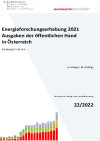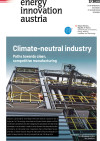Suchergebnisse
IEA DHC Annex TS2: Konferenz Präsentation: Reduced System Temperatures in Heating Networks (2020)

Die Präsentation ist im Rahmen des Annex TS2 entstanden und stellt die Methodik zur Berechnung des Effekts niedriger Systemtemperaturen dar.
Herausgeber: Aalborg University, Department of Planning, 2020
Englisch, 14 Seiten
Downloads zur Publikation
IEA Bioenergy Task 39 Workshop – Neues zur Produktion und Anwendung von erneuerbaren Treibstoffen in Österreich
21. Oktober 2021
Online
Im Rahmen der Veranstaltung gaben Firmen und Forschungseinrichtungen den knapp 80 Teilnehmenden aus Industrie, Forschung und Ministerien einen Einblick in den aktuellen Status ihrer Arbeiten und ihrer Pläne für die Zukunft im Bereich erneuerbare Treibstoffe.
IEA SHC Task 55: Webinar "Large Scale SHC Systems Integration"

Videoaufzeichnung des Solar Academy Webinars mit Schwerpunkt auf IEA SHC Task 55 vom 21. März 2019.
Herausgeber: International Solar Energy Society (ISES)
Englisch
IEA 4E Annex EDNA: Elektronische Geräte und Netzwerke Annex (Arbeitsperiode 2019 - 2021)
Bis 2030 soll die Zahl netzwerkverbundener elektronischer Geräte weltweit auf über 100 Milliarden steigen, mit erheblichen Auswirkungen auf globale Energieverbräuche. Der IEA 4E Electronic Devices and Networks Annex – EDNA hat daher zum Ziel, Maßnahmen zur Förderung der Energieeffizienz netzwerkverbundener Geräte zu empfehlen und diese wichtigen Stakeholdern wie politischen Entscheidungsträger:innen und Produktentwickler:innen in Form von Berichten, Policy Briefs und Tools zur Verfügung zu stellen.
IEA PVPS Task 14: Solar PV in the 100% Renewable Energy Source based Power System (working period 2018 - 2024)
The IEA-PVPS Task 14, which was completed in 2024, promoted international cooperation to create the technical basis for a 100% renewable energy-based electricity supply with photovoltaics as a central pillar. The task focused on integral approaches for the operation and planning of power supply systems with photovoltaics, as well as integration into smart grids, with the aim of using the energy generated optimally and efficiently to cover consumption.
IEA-PVPS Task 13: Performance, Operation and Reliability of Photovoltaic Systems (Working period 2018 - 2021)
The IEA Task 13 develops independent, internationally valid analyses and recommendations for the operation and reliability of PV systems and their components. The continuation of the Austrian participation ensures the flow of information back to the Austrian photovoltaic industry through international cooperation and strengthens Austria as a location for innovation and production.
IEA IETS Annex 19: Artikel "Industrielle Elektrifizierung" (2020)

Im Rahmen des IEA IETS Annex 19 werden nationale Forschungstätigkeiten zum Thema Elektrifizierung der Industrie gesammelt, gebündelt und aufgearbeitet. Schwerpunkte sind die unterschiedlichen technischen Ansätze sowie die notwendige technische und legislative Infrastruktur. Der Artikel ist in der Zeitschrift „nachhaltige technologien“ Ausgabe 01-2020 erschienen.
Herausgeber: AEE - Dachverband, nachhaltige technologien 01-2020, Seite 32
Deutsch, 1 Seiten
Energy Technology Perspectives 2020 – Special Report on Clean Energy Innovation

Die durch die Covid-19-Pandemie ausgelöste Wirtschaftskrise droht ein Rückschlag für die Innovationsbemühungen im Bereich der sauberen Energie zu sein, zu einer Zeit, in der schnellere Fortschritte erforderlich sind. Der vorliegende Bericht der IEA bewertet den Bedarf an technologischen Innovationen und Investitionen für einen saubereren und widerstandsfähigeren Energiesektor bei Netto-Null-Emissionen. Er identifiziert technologische Schlüsselfaktoren, die zur Beschleunigung der Innovationszyklen beitragen können.
Herausgeber: International Energy Agency
Englisch, 185 Seiten
IEA Bioenergy Task 39 und 41: Bericht und Webinar "Advanced Biofuels – Potential for Cost Reduction"

Der Bericht beschäftigt sich mit der Frage, welche Möglichkeiten es gibt, die Produktionskosten einer Reihe fortschrittlicher Biokraftstoffe zu senken und festzustellen, unter welchen Bedingungen sie erschwinglich werden könnten. Im Webinar am 23. April 2020 wurde der Bericht präsentiert.
Herausgeber: IEA Bioenergy Task 39 und 41, 2020
Englisch, 88 Seiten
Downloads zur Publikation
IEA EGRD Workshop "Green Fuels": Executive Summary (2019)

Am 21. und 22. Oktober 2019 organisierten die Delegierten der IEA Experts’ Group on R&D Priority Setting (EGRD) einen internationalen Workshop zum Thema „Green Fuels“. Ziel war es, weitere Erkenntnisse über den Forschungs- und Innovationsbedarf im Zusammenhang mit „Green Fuels“ zu gewinnen.
Herausgeber: IEA Experts’ Group on R&D Priority Setting and Evaluation, 2019
Englisch
Downloads zur Publikation
IEA HPT Annex 48: An analysis of heat pumps for industrial applications (2019)

Die Veröffentlichung behandelt wirtschaftliche Betrachtungen von Absorptions- und Kompressionswärmepumpen für industrielle Anwendungen.
A. Arnitz, R. Rieberer, V. Wilk
Herausgeber: ISEC International Sustainable Energy Conference 2018 Renewable Heating and Cooling in Integrated Urban and Industrial Energy Systems, Proceedings, AEE Intec, Graz, 2018
Englisch, 9 Seiten
Downloads zur Publikation
IEA AFC Annex 35: Entwicklung langzeitstabiler Luftelektroden für Zink-Luft Fließbatterien (2017)

In diesem Artikel wird die Entwicklung einzelner Komponenten für Zink-Luft-Fließbatterien beschrieben. Der Fokus wurde speziell auf die Entwicklung von bi-katalysierten Luftelektroden gelegt.
Pichler, B., Hacker, V.
Herausgeber: CEET konkret, pp. 32-33, 2017
Englisch, 2 Seiten
Downloads zur Publikation
IEA SHC PVT Task 60: Design Guidelines for PVT Collectors (2020)

Die Design Guidlines zu Photovoltaik-Thermie (PVT) Kollektoren geben einen Überblick über die wesentlichen Komponenten und Ausprägungen.
J.-C. Hadorn
Herausgeber: IEA SHC Task 60
Englisch, 1 Seiten
Downloads zur Publikation
Vernetzungstreffen zur Stadt der Zukunft-Einreichung 2021
29. Jänner 2021, 9:30 - 11:45 Uhr
Online
Die Innovationslabore GRÜNSTATTGRAU, act4energy und Digital Findet Stadt laden Sie herzlichst zum Matchmaking für die 8. Ausschreibung des Programms "Stadt der Zukunft" ein. Ziel ist, Projektpartner zu finden, Kompetenzen zu verbinden und an Projektideen zu arbeiten. Gemeinsamkeiten zwischen den unterschiedlichen Themenbereichen und Möglichkeiten der Zusammenarbeit mit den Innovationslaboren sollen eruiert werden.
IEA Wind Task 52: Breitenanwendung von Wind Lidar (Arbeitsperiode 2022 - 2026)
Der Task 52 arbeitet an der breiten Einführung von Wind-LiDAR-Systemen und bietet durch globale Vernetzung die Möglichkeit zur Erzeugung und Verbreitung von Wissen und Erfahrungen. Die Energiewerkstatt trägt mit einer Vergleichsstudie zur Datenverfügbarkeit verschiedener LiDAR-Messprinzipien unter alpinen Bedingungen zum Task 52 bei und wird eine koordinierende Rolle in der Erstellung von Richtlinien für den Einsatz von Boden-gebundenem LiDAR in Windenergieanwendungen übernehmen.
Bioenergy and Sustainable Development - Climate Change Mitigation and Opportunities for Sustainability Co-Benefits
23. - 24. May 2022
Online, AT
The aim of this e-Workshop is to provide practical information to qualify the contributions of bioenergy to climate change mitigation, highlight the opportunities and co-benefits of biomass supply chains (beyond energy provision) and open the prospects of stimulating such co-benefits and managing trade-offs.
IEA Bioenergy TCP: Success Stories of Advanced Biofuels for Transport (2020)

IEA Bioenergy erstellt eine Reihe von Success Stories. Sie sollen Beispiele mit einer breiten Abdeckung in Bezug auf geografische Regionen, Rohstoffe, Endnutzung und Akteure liefern.
Herausgeber: IEA Bioenergy, ARTFuels, European Commission, 2020
Englisch, Jeweils 5 Seiten Seiten
Energieforschungserhebung 2021 - Ausgaben der öffentlichen Hand in Österreich. Erhebung für die IEA

Die Energieforschungsausgaben der öffentlichen Hand erreichten im Jahr 2021 dank Konjunkturprogrammen einen bisher höchsten Wert von 224,1 Millionen Euro, das entspricht einer Steigerung von 44,4%.
Schriftenreihe
22/2022
A. Indinger, M. Rollings
Herausgeber: BMK
Deutsch, 123 Seiten
Downloads zur Publikation
Climate-neutral industry

Paths towards clean, competitive manufacturing
energy innovation austria
2/2022
Herausgeber: BMK in cooperation with the Climate and Energy Fund
Englisch, 16 Seiten
Downloads zur Publikation
Neue Produkte und Wege für eine kreislauf-orientierte Bioökonomie
20. September 2022, 13:00 - 16:30 Uhr
TU Graz
Lernen Sie innovative Start-Ups kennen und gewinnen Sie Ein- und Ausblicke in die aktuellen Forschungsprojekte aus dem Bereich “Kreislauf-orientierte Bioökonomie”. Aktivitäten aus dem IEA IETS Programm zu industriellen Bioraffinerien werden vorgestellt.
